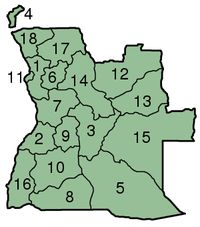|
Background
Angola, officially the Republic of Angola (Portuguese: República de Angola, is a country in south-central Africa bordering Namibia to the south, Democratic Republic of the Congo to the north, and Zambia to the east, and with a west coast along the Atlantic Ocean. The exclave province Cabinda has a border with the Republic of the Congo and the Democratic Republic of the Congo. Angola was a Portuguese colony from the 16th century to 1975. The country is the second-largest petroleum and diamond producer in sub-Saharan Africa, yet its people are among the continent's poorest. According to the International Monetary Fund, more than $4 billion in oil receipts have disappeared from Angola's treasury in the 2000s. In August 2006, a peace deal was signed with separatist rebels from the Cabinda exclave in the North. About 65% of Angola's oil comes from that region.
Politics
Angola's motto is Virtus Unita Fortior, a Latin phrase meaning "Virtue is stronger when united." The executive branch of the government is composed of the President, the Prime Minister (currently Fernando da Piedade Dias dos Santos) and Council of Ministers. Currently, political power is concentrated in the Presidency. The Council of Ministers, composed of all government ministers and vice ministers, meets regularly to discuss policy issues. Governors of the 18 provinces are appointed by and serve at the pleasure of the president. The Constitutional Law of 1992 establishes the broad outlines of government structure and delineates the rights and duties of citizens. The legal system is based on Portuguese and customary law but is weak and fragmented, and courts operate in only twelve of more than 140 municipalities. A Supreme Court serves as the appellate tribunal; a Constitutional Court with powers of judicial review has never been constituted despite statutory authorization.
The current government has announced an intention to hold elections in 2008. These elections would be the first since 1992 and would serve to elect both a new president and a new National Assembly.
Provinces and districts
Angola is divided into eighteen provinces (províncias) and 163 municipalities. The provinces are:
- Bengo
- Benguela
- Bié
- Cabinda
- Cuando Cubango
- Cuanza Norte
- Cuanza Sul
- Cunene
- Huambo
- Huila
- Luanda
- Lunda Norte
- Lunda Sul
- Malanje
- Moxico
- Namibe
- Uíge
- Zaire
|
 |
Economic overview
Angola's economy has undergone a period of transformation in recent years, moving from the disarray caused by a quarter century of war to being the second fastest growing economy in Africa and one of the fastest in the world. In 2004, China's Eximbank approved a $2 billion line of credit to Angola. The loan is being used to rebuild Angola's infrastructure, and has also limited the influence of the International Monetary Fund in the country.
Growth is almost entirely driven by rising oil production which surpassed 1.4 million barrels (220,000 m³) per day in late-2005 and which is expected to grow to 2 million barrels (320,000 m³) per day by 2007. Control of the oil industry is consolidated in Sonangol Group, a conglomerate which is owned by the Angolan government. In December 2006, Angola was admitted as a member of OPEC.[12] The economy grew 18% in 2005, 26% in 2006 and 17.6% in 2007 and it's expected to stay above 10% for the rest of the decade. The security brought about by the 2002 peace settlement has led to the resettlement of 4 million displaced persons, thus resulting in large-scale increases in agriculture production.
The country has developed its economy since political stability arose in 2002. However, it faces huge social and economic problems as a result of an almost continual state of conflict since 1961, although the highest level of destruction and socio-economic damage was reached after the 1975 independence, during the long years of civil war. Rapidly rising production and revenues from the oil sector have been the main driving forces behind the improvements in overall economic activity - nevertheless, poverty remains widespread. Anti-corruption watchdog Transparency International rated Angola one of the 10 most corrupt countries in the world in 2005. The capital city is the most developed and the only large economic center worth mentioning in the country, however, slums called musseques, stretch for miles beyond Luanda's former city limits.
According to an American think tank, oil from Angola has increased so significantly that Angola now is China's biggest supplier of oil.
Demographics
Angola is composed of Ovimbundu 37%, Kimbundu 25%, Bakongo 13%, mestiços (mixed European and native African) 2%, European 1%, and 22% 'other' ethnic groups.
Angola is a majority Christian country, with 53% of citizens professing the religion. Most Angolan Christians are Roman Catholic, 38%, or Protestant, 15%. 46.8% of Angolans practice indigenous beliefs.
It is estimated that Angola was host to 12,100 refugees and 2,900 asylum seekers by the end of 2007. 11,400 of those refugees were originally from the Democratic Republic of Congo (Congo-Kinshasa) who arrived in the 1970s.
Culture
Portugal ruled over Angola for 400 years and both countries share cultural aspects: language (Portuguese) and main religion (Roman Catholic Christianity). The Angolan culture is mostly native Bantu which was mixed with Portuguese culture. In the Moxico province more than 10,000 persons are Spanish-speaking (ca. 4.34% of the population of this province) due to the presence of Cuban troops during the civil war.
|